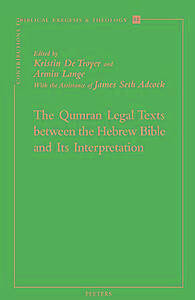
- Retrait gratuit dans votre magasin Club
- 7.000.000 titres dans notre catalogue
- Payer en toute sécurité
- Toujours un magasin près de chez vous
- Retrait gratuit dans votre magasin Club
- 7.000.000 titres dans notre catalogue
- Payer en toute sécurité
- Toujours un magasin près de chez vous
The Qumran Legal Texts between the Hebrew Bible and its Interpretation
Troyer K.//Lange De
45,00 €
+ 90 points
Description
How do the halakhic texts from Qumran as well as those Biblical Dead Sea Scrolls, which attest to legal texts of the Hebrew Bible, lead to a new interpretation and understanding of the Pentateuchal law collections and other legal texts in the Hebrew Bible and how do they help to illuminate the reception history of the Torah? These are the central questions of this book. The book consists of three parts: Part I: The Legal Texts from Qumran and the Hebrew Bible, Part II: The Legal Texts from Qumran and Second Temple Judaism and Part III: The Legal Texts from Qumran and Rabbinic Judaism. The volume contains an Introduction by Armin Lange and Kristin De Troyer and articles by Sidnie White Crawford (The Qumran Pentateuch Scrolls: Their Literary Growth and Textual History), Innocent Himbaza (The Rite of the Blood on the Altar and the Hierarchy of Sacrifices: Qumran Texts, Septuagint and Mishnah as Witnesses to a Law in Evolution), Michaela Bauks (Jephtas Gelubde und die Unabwendbarkeit seiner Einlosung), Loren T. Stuckenbruck (The Pentateuch and Biblical Interpretation in the Enoch Literature from the Second Century BCE), Eckhard Otto (Temple Scroll and Pentateuch: A Priestly Debate about the Interpretation of the Torah), Simone M. Paganini (Die deuteronomistische Fassung des Konigsgesetzes und ihre Interpretation innerhalb der Tempelrolle: Rechtshermeneutische Beobachtungen), Bernhard Dolna (The Hidden and the Revealed Torah in Philo and Qumran), Lawrence H. Schiffman (Light from the Qumran Scrolls on Rabbinic Literature ), Gunter Stemberger (Mishnah and Dead Sea Scrolls - a Reflection on Continuity and Change) and Hannah K. Harrington (Examining Rabbinic Halakhah through the Lens of Qumran).
Spécifications
Parties prenantes
- Auteur(s) :
- Editeur:
Contenu
- Nombre de pages :
- 183
- Langue:
- Néerlandais
- Collection :
- Tome:
- n° 61
Caractéristiques
- EAN:
- 9789042925359
- Date de parution :
- 15-11-11
- Format:
- Livre broché
- Format numérique:
- Trade paperback (VS)
- Dimensions :
- 137 mm x 196 mm
- Poids :
- 249 g







